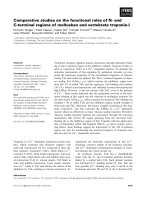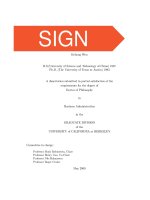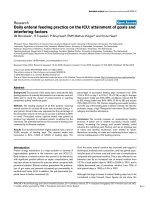Touchdown achieving your greatness on the playing field of business and life
Bạn đang xem bản rút gọn của tài liệu. Xem và tải ngay bản đầy đủ của tài liệu tại đây (1.29 MB, 188 trang )
From the Library of Garrick Lee
Touchdown!
From the Library of Garrick Lee
This page intentionally left blank
From the Library of Garrick Lee
Touchdown!
Achieving Your Greatness
on the Playing Field of Business
(and Life)
Kevin Elko
From the Library of Garrick Lee
Vice President, Publisher: Tim Moore
Associate Publisher and Director of Marketing: Amy Neidlinger
Editorial Assistant: Pamela Bolan
Development Editors: Russ Hall, Zachary Moore
Operations Manager: Gina Kanouse
Digital Marketing Manager: Julie Phifer
Publicity Manager: Laura Czaja
Assistant Marketing Manager: Megan Colvin
Cover Designer: Rodrigo Corral Design
Design Manager: Sandra Schroeder
Managing Editor: Kristy Hart
Senior Project Editor: Lori Lyons
Copy Editor: Bart Reed
Proofreader: San Dee Phillips
Senior Indexer: Cheryl Lenser
Senior Compositor: Gloria Schurick
Manufacturing Buyer: Dan Uhrig
© 2010 by Pearson Education, Inc.
Publishing as FT Press
Upper Saddle River, New Jersey 07458
FT Press offers excellent discounts on this book when ordered in quantity
for bulk purchases or special sales. For more information, please contact
U.S. Corporate and Government Sales, 1-800-382-3419, For sales outside the U.S., please contact International Sales
at
Company and product names mentioned herein are the trademarks or registered trademarks of their respective owners.
All rights reserved. No part of this book may be reproduced, in any form or
by any means, without permission in writing from the publisher.
Printed in the United States of America
First Printing July 2009
ISBN-10: 0-13-701960-2
ISBN-13: 978-0-13-701960-1
Pearson Education LTD.
Pearson Education Australia PTY, Limited.
Pearson Education Singapore, Pte. Ltd.
Pearson Education North Asia, Ltd.
Pearson Education Canada, Ltd.
Pearson Educación de Mexico, S.A. de C.V.
Pearson Education—Japan
Pearson Education Malaysia, Pte. Ltd.
From the Library of Garrick Lee
This book is dedicated to my children,
Claire and Jared.
I had a vision of what you two would be, but
you both are so much more.
Thanks for all you taught me.
From the Library of Garrick Lee
This page intentionally left blank
From the Library of Garrick Lee
Contents
About the Author xi
Foreword by Butch Davis xiii
Foreword by Jon Dorenbos xviii
Preface xxiii
Introduction 1
ONE
Growing Up
Therapy
Economics
7
11
12
Lessons from a Pencil
15
TWO
You Do Not Have to Carry More
Than You Can Hold 21
Your Right to Be Offended
(Instead, Ease Up; Do Not Judge)
27
That Was Awful (Instead, Save the Label
“Awful” for the Big Stuff) 30
THREE
Cutting the Internal Mental Clutter
35
The Need to Be Liked
(Instead, Say It’s Nice to Be Liked,
But I Don’t Need It) 37
From the Library of Garrick Lee
viii
touchdown!
Expecting Too Hard and Not Bringing
the Best You to Every Event 41
Not Forgiving—the Ultimate Mind Clutter
46
FOUR
Just One Last Play
51
Make the Last Play Count
Let Your Light Shine
54
57
Make a Good Choice with
Your Last Play of a Season 59
Security
60
FIVE
Seasons of Life
63
Preparation—The Preseason
67
Action—The Season 70
The Bye Week
72
Maintain and Accelerate—
The Playoffs 72
Rest—The Off-Season
74
SIX
The Preseason: It Happens Before It Happens
Against the Odds
77
82
The Four Legs of a Chair
The Wheel of Fortune
85
88
From the Library of Garrick Lee
contents
Radio Waves
ix
91
Thankful on Credit 95
Journaling
96
SEVEN
The Action Season: You Do Not Get What
You Want—You Get What You Deserve 97
This Is the Season of Action 100
Start with the Process
101
Start Making Your Move
103
Now Stay on the Process
105
Set Up an Internal Vocabulary of
Encouragement 106
Too Hard to Play Hard 108
A Focus
109
What Is Determination?
111
A Great Example of a Life of Process
113
EIGHT
The Playoffs
115
Claim It 118
NINE
The Off-Season 123
My Wish
129
From the Library of Garrick Lee
x
touchdown!
TEN
Speaking Out:
Heart Song Catalogue of Catchphrases 131
Anti-Fear Heart Songs
136
Anti-Worry Heart Songs 137
Phrases to Fend off Anger
138
Phrases to Ease the Hard
139
Anti-Rejection Phrases 141
Songs to Prevent
Laziness and Passivity 143
Phrases for Patience
145
Phrases Against Watering Down
Your Dream 147
Index
149
From the Library of Garrick Lee
xi
About the Author
Dr. Kevin Elko is a nationally renowned performance consultant and motivational speaker.
He has consulted with dozens of professional
and collegiate athletic teams, including LSU,
Miami, Nebraska, the Pittsburgh Steelers, and
the Dallas Cowboys.
He has also worked with companies including
Travelers Insurance, Smith Kline Beecham,
Prudential Securities, and Tyson Foods. In
2005, he was the top-rated speaker at the Million
Dollar Roundtable, a meeting of the insurance
industry’s highest achievers.
Dr. Elko’s books include Nerves of Steel and
Winning the NFL Way. Elko holds a Doctorate in Education with emphasis in Sports and
Counseling.
From the Library of Garrick Lee
This page intentionally left blank
From the Library of Garrick Lee
xiii
Foreword by Butch Davis
I once read that most people can be changed
from a relationship with one person. Th is is
exactly what happened in my relationship
with Kevin Elko. I had heard about him from
several people in the National Football League,
specifically his work with the Pittsburgh Steelers.
He was known as someone who could help you
identify and select players with a great att itude
and leadership ability. When I took over as the
head coach of the University of Miami Football
program, having players with a great att itude
and leadership abilities was exactly what we
needed; in fact, the program was in such disarray
that year that there was a Sports Illustrated cover
article calling for the University of Miami to
drop football. All the way around, we had many
challenges—and if we did not have a plan to
overcome these challenges, we were doomed.
We decided our problem at Miami was culture.
We had inherited a culture that was producing
ineffective results, so we quickly decided to rid
ourselves of that culture and to develop another.
From the Library of Garrick Lee
xiv
touchdown!
Whether you realize it or not, every team—and
for that matter, every business, family, and individual—has a set of att itudes that they live by,
and that collection of att itudes is the culture,
and that culture brings whatever “results” you
are gett ing. It is not something “out there,” such
as the environmental conditions that give or
take away, but rather something “in there” or in
you, that brings about the quality of your life.
Therefore, at Miami we developed a vision and
mission statements of what we wanted those
att itudes to be; and our day-to-day operation
was not to win, because winning is a by-product, and winning would take care of itself. Our
vision was to keep moving toward that culture
with the att itudes we had set for ourselves and
to be relentless in focusing on those desired att itudes that positively added to the desired culture. It was that simple.
Now more than ever before, this is an important
concept. Today there is a belief out there that is
becoming more and more popular that someone
else is going to do it for you, and this entitlement is going to be spread around. In the short
term that idea may happen, but to buy in to this
From the Library of Garrick Lee
for ewor d
xv
kind of thinking over the long term will hurt
the believer of this idea. One concept Kevin
has repeatedly taught our teams is, “You never
get what you want, but you always get what you
deserve.” If you work hard and develop your
gifts that were given you, and you have a vision
of serving and helping others, then what do you
deserve? But if you do not work hard on yourself
and are not concerned about those around you,
then what do you deserve? America was founded
on hard work and serving others. Th is vision
and mission will help you receive more. Not
only did this way of thinking help the University of Miami win more than 30 straight games
and bring respectability back to the program, it
developed a record number of fi rst-round draft
picks for the National Football League.
Another winning culture-developing concept
Kevin brought to us was to “Keep planting
grass, and don’t pull weeds.” We had our share of
weeds. We were also faced with a limited number of college scholarships and we were on probation, so it was very important that we made
wise choices in the selection of our players. We
constantly reminded ourselves, “Keep planting
From the Library of Garrick Lee
xvi
touchdown!
grass.” In other words, we knew we had to stay
focused on what we wanted and keep doing the
things that would bring positive results instead
of focusing on what was wrong and the negatives. It took some time, but our players and staff
completely bought into this concept. Th is overall culture eventually became one of the longest
winning streaks in college football history. If
you’re not careful, it’s easy to focus on the negatives and all the things you don’t have instead
of the opportunities that you do have. Another
name for this way of thinking is fear. Individuals who think this way need to understand they
are helping to bring about that fear. As Job 3:25
states: “For the things I greatly fear come upon
me, and that of which I am afraid befalls me.” If
you focus on what you do not want, it becomes
a self-fulfi lling prophecy and manifests itself in
your world. When we started at Miami, it would
have been easy to focus on the things that we did
not want.
There were other culture-developing concepts
that Kevin taught us, such as, “Never look at
the scoreboard”; “Accept accountability”; “If
you trust you may be disappointed, but if you
From the Library of Garrick Lee
for ewor d
xvii
do not trust, you will lose”; and one of my favorites, “Sipping on battery acid, chopping down
trees.” These things, repeated over and over and
then reinforced by me and my staff, became the
eventual winning culture of my teams in Miami
These same concepts are taking hold and having
a huge positive effect for myself, our staff, and
our players at the University of North Carolina.
Th is book teaches those concepts of vision and
serving in an enjoyable read. I have often told
Kevin that, other than my wife and son, he has
been one of the most influential individuals
in my life. It is not just his lessons but also his
friendship over the years. Just as one individual
makes a difference, so can one book make a difference. If you follow what this book teaches,
you will not need anything “spread around” to
you, because you will earn what you deserve,
which is victory.
Butch Davis
Head Football Coach
University of North Carolina at Chapel Hill
From the Library of Garrick Lee
xviii
Foreword by Jon Dorenbos
In the summer of my twelfth year of life, I went
to a baseball camp. One day a policeman pulled
up and said he wanted to talk to me. He worded
the conversation like this, “Your mother and
father got into an argument and your mother
did not make it.” I asked, “What do you mean?”
He explained, “Today your father killed your
mother.” My family had lived a privileged existence. We lived in Seatt le, where my father was
wealthy, having worked at Microsoft—he had
just left to help start up a new company, Oracle.
Basically, we had everything we wanted. Yet,
in one day, that life I knew was taken away, as
well as my mother, my father, and a day-to-day
relationship with my sister and brother because
eventually the foster care system stepped in. I
lost contact with my siblings for years.
I have learned that there is only one way to overcome a nightmare, and that is with a dream.
Eventually I got to go back to visit Seatt le for
an All-Star Litt le League Baseball game, where
I met a magician, and maybe that was the way
I learned I could escape by burying myself in
From the Library of Garrick Lee
for ewor d
xix
magic. At about that time, I could use a litt le
magic with my lifestyle: my mother, my father,
and my relationship with my brother and sister
were gone. So I fi rst got a dream to be a magician, and it consumed me. But I learned never
to be arrogant with it, because magic is about
the relationship you establish with your crowd.
I loved it.
Then I got another dream. I watched Ken Griffey
play baseball in Seatt le and used to think, “I am
going to make it to professional sports.” I went
on to play college football at Texas, El Paso,
but was too small to go to the next level. So I
taught myself to long snap, sent a video of my
snapping the football to all pro teams, and The
Bills offered me a chance to try out. There I met
someone else who shaped my life.
Before my fi rst exhibition game with the Bills,
a boy hung over the fence, and I invited him to
come down onto the field to throw a few passes
with me. When I looked at his father, he was
crying, and I thought, “What did I do wrong?” I
walked over to the father, who said that the boy I
was playing with was his son, who had leukemia,
and had six months to live. When you go through
From the Library of Garrick Lee
xx
touchdown!
what I went through, basically losing your whole
family, you have an especially soft spot for anyone hurting, but especially for children.
The litt le boy’s name was Joey, and we became
friends. That fall Joey handed me a piece of
paper that said Super Bowl Oct. 15, and he asked
me to come. I said, sure, and placed the ticket on
my refrigerator. He called me on Oct. 15 to ask
me to come to the hospital to see him because it
was the Super Bowl, so I did. When I got there,
I asked him what was up and he said, “Today is
my Super Bowl. It’s six months today that I was
supposed to die.” He was still alive, he had made
it six months, and he wanted me to celebrate
with him. That is what I call having a dream to
overcome a nightmare. Before Joey “changed
addresses,” he taught me even more about how
to dream, forgive, and give. I was a pallbearer
at Joey’s funeral along with some other Buffalo
Bills players. He had a lot to do with teaching
me what is in this book: the child is father to the
man.
While at the Bills, I met Dr. Elko, who taught
me something I already knew, but I needed to
know it on a deeper level. It is something I need
From the Library of Garrick Lee
for ewor d
xxi
to hear over and over. First, we need to dream
again and again, outrageous dreams, and when
we do, nightmares fade. Also, he taught me that
you have to give up something for this dream
because, if what you receive is more important
to you than what you have to give up, then you
will give up what you have to pay for the dream.
Next, we have to fi nd it in ourselves to forgive,
somehow, for people being lost in life. Finally,
giving back is our way of saying “thank you” for
all the people who helped us when we needed it.
These are all truths.
Today I play in the National Football League,
and I am about to marry the woman of my
dreams. Most importantly, I work to help WIN,
which is a foundation that assists abused woman,
and with multiple charities that help children,
in addition to going to orphanages on holidays
to perform magic. In a strange way, when I do
these things, I am helping my mother, sister, and
brother.
One day I asked my position coach what time
it was, and when he looked at his wrist, he
screamed, “My watch is gone”; then I handed
him back his watch (an old magician’s trick). He
From the Library of Garrick Lee
xxii
touchdown!
looked at me and said, “You think that trick was
good? If you screw up on the field, I will make
you disappear even quicker.” Once you accept
it, the truth can be your friend, and that truth
keeps me improving and focused every day; and
as soon as I am not doing those things, trust me,
I am gone. That scenario is the way the National
Football League works.
I have heard Dr. Elko speak a number of times
and as he is speaking, I say to myself, “Yes.” The
message in this book is the one taught by the
magician who fi rst taught me, by Joey, and by
everybody I know whose words have rung true
with the spirit that has been emerging from me.
I live and love hearing this message, because it
saved me. As the commercial says, “Try it; you’ll
like it.” The doc rocks.
Jon Dorenbos
#46, Philadelphia Eagles
From the Library of Garrick Lee
xxiii
Preface
Th is is a terrific book. My hope is that you read
it, practice the principles you fi nd here, and
make a great life for yourself. The world needs
you to be successful. Touchdown! can help a lot.
I’d like to tell you how and why. So please take a
few moments and read on.
I used to be an ad man in Australia. My mother
and father had been artists—of the mostly starving variety, as I liked to quip. Before I was born,
my dad went off to the Second World War where
he was injured. He was shipped back to Australia, and after a litt le while he died. My mom did
the best she could, but I didn’t have to be psychic to know we were poor.
Being a reasonably bright lad, I figured that
the solution to being poor was to make money,
which as far as I could tell back then, was the only
reason to get an education and endure going to
high school and then on to college. The thing
about going to college, as compared to going to
high school, was that dropping out was less of a
big deal in the 60s. So I dropped out and put my
creative genes to work as an advertising photographer and creative director. Turned out I loved
From the Library of Garrick Lee
xxiv
touchdown!
it and was really good at it. Which was just as
well—in today’s world, not graduating from college is a seriously bad idea.
Since I’d convinced myself that the secret to
being happy was to acquire and consume the
right stuff, being a creative type in advertising
seemed like the perfect career choice. Basically,
I became the guy telling you that if you wanted
to have a great life, you prett y much had to
acquire and consume the right stuff—and that
would be our client’s stuff. I was the guy telling
you that things actually went better with Coke,
that if your deodorant failed your life would, and
that if you didn’t use my client’s toothpaste you
wouldn’t even get kissed, let alone have a chance
for anything else you were hoping for later on.
Then one morning I woke up and realized I had
solved the problem of being poor. I had enough
stuff to start my own world. Next I reasoned that
if having enough stuff was going to make me feel
successful and happy on the inside, it would’ve
worked by now. It hadn’t. And it didn’t seem
like more stuff would work any better. So I dusted
off my college philosophy and psychology
textbooks and began to realize that living
From the Library of Garrick Lee









